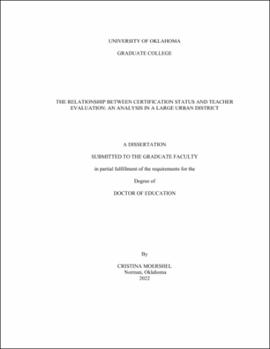| dc.contributor.advisor | Velazquez, Mirelsie | |
| dc.contributor.author | Moershel, Cristina | |
| dc.date.accessioned | 2022-12-07T20:22:08Z | |
| dc.date.available | 2022-12-07T20:22:08Z | |
| dc.date.issued | 2022-12-16 | |
| dc.identifier.uri | https://hdl.handle.net/11244/336882 | |
| dc.description.abstract | Teacher shortages are a growing problem across the United States. As one means of addressing this problem, policy makers have sought to loosen barriers to the profession by creating provisions for emergency certification. Emergency-certified teachers require no teaching experience, although they are required to have some experience working in the subject area. Research on emergency-certified teachers reports that these teachers have lower value-added measures, but this literature lacks information on how these teachers perform on teacher evaluations. In this study, the relationship between teacher evaluation scores and a teachers’ certification status is investigated. Data are derived from a sample of teachers (n = 1285) in a large urban district. Results indicate small but significant associations between teacher certification and evaluation scores, with a difference in scores between -0.22 and -0.80. Furthermore, the results are consistent across different statistical models. | en_US |
| dc.language | en_US | en_US |
| dc.subject | emergency certificate | en_US |
| dc.subject | teacher quality | en_US |
| dc.subject | emergency certified teachers | en_US |
| dc.subject | teacher certification | en_US |
| dc.title | The relationship between certification status and teacher evaluation: an analysis in a large urban district | en_US |
| dc.contributor.committeeMember | Raymond, Kate | |
| dc.contributor.committeeMember | Hamlin, Daniel | |
| dc.contributor.committeeMember | Ford, Timothy | |
| dc.date.manuscript | 2022 | |
| dc.thesis.degree | Ed.D. | en_US |
| ou.group | Jeannine Rainbolt College of Education::Department of Instructional Leadership and Academic Curriculum | en_US |
| shareok.nativefileaccess | restricted | en_US |
